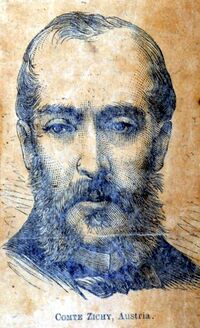
< Recent Materialistic Speculations Viewed in the Light of Spiritualism (continued from page 3-56) >
the universe, and relegated him to an obscure heaven from which he never issues. Or will they attempt to demonstrate the Resurrection to the satisfaction of the Professors? Nine-tenths of them would attempt to force on them the resurrection of the body, ignorant or regardless of the fact that such a gathering of particles long since resolved into other forms of existence is physically impossible. They reck little of miracles who propound such a monstrous portent. The miracles of the world agglomerated and condensed would be mild occurrences compared to that. The rest of the Prophets who have cast aside such ignorant superstition would find no weapon in their armory that might hew through the shield of unbelief. If they talked of universal belief, they would but be met by the correction, “common superstition.” If they talked of instinct implanted in the soul, they would be met by denial of the soul’s existence, and a reference to Molecular Action. In a word, they have need of the proof which we alone can give.—that of experimental knowledge, of reiterated interviews with those who have cast aside the body, and who have, in countless instances, returned to us the same intelligences, with the same feelings and affections, and the same knowledge as they had when embodied amongst us.
Spiritualism alone can meet that dreary cheerless Nihilism which has found such uncompromising exponents at Belfast. It alone can tell the world of a creed founded not upon tradition, but upon experience: a creed commendable to reason, and satisfying to man’s deepest wants. It will tell the Professors that Goa not only exists, but operates in our midst now as heretofore: and it will tell the Preachers of Orthodox Christianity that He is not the Anthropomorphic creation that they are wont to picture him. It will demonstrate by rigid scientific process existence beyond the grave: and it will tell all that that existence is not the hibernation that some seem to fancy, any more than it is a dwelling in the helpless hell, or the dreary heaven that orthodoxy has imagined. It will trace out a rational scheme of existence gradually developed from the present without-break, and without spasmodic change, a scheme of regular growth in accordance with rational and intelligible laws of progress.
When will those who speak to their fellow-men on religious topics recognize the fact that the Gospel which they preach is one that too often is so overlaid with figments of human error as to have lost its charm for thinking men? With the Bible in their hands, can they not see that a cycle of Revelation is waning to its close, and that to an advanced and progressive race an advanced Gospel is being preached? God is revealing to an age that needs it a fuller and clearer knowledge of Himself. Doubtless the fogs and mists of error and deceit do hang around the truth. But what of that? Has it not always been so? Has God ever saved man the trouble of gaining truth by experience? And what is the use of the Watchman if his eyes cannot discern the signs of the times? If his gaze cannot penetrate the thin veil, let him yield his place to one who has more piercing vision. To men of Science and men of Religion alike we say with confidence, “Sirs, the battle between you is one in which we alone can mediate.” The claims of that department of human knowledge which arrogates to itself the exclusive name of Science are incompatible with those of Orthodox Theology. This has long been apparent to every one but Theologians. That which alone can resuscitate popular Religion, a» an active vitalizing power, is precisely that element which Spiritualism can furnish,—Rational Faith, confirmed by Accurate Knowledge. To the man of Science the experimental knowledge must come home before he can accept from the Theologian the Creed which he has to offer. And to the Theologian there must come a revelation of increased knowledge before he can offer to thinking men a tangible and realizable creed. Science and Religion in the future must unite on the ground of Spiritualism: and then we may hope that the Professors will cease from troubling, and the Preachers be at rest That Millennial Epoch, alas! is distant still. It will not come till Scientific Dogmatism is extinct, and Theological Bigotry is past. Science may be trusted to live in spite of its dogmatism; but it will go harder with Orthodox Theology, unless its professors learn wisdom, and cease to claim a monopoly of knowledge and revelation. It is easy to refer all that contradicts their self-made creeds to Diabolic Agency: to sneer at “Science falsely so called,” and to vaunt the exclusive merit of their own form of faith. They will find such a line of argument of no avail with such as have fathomed questions into which they have declined to look, any more than they will succeed with such men as Tyndall and Huxley. If they will study the Bible instead of quoting it, they will find that history repeats itself, and that the points of similarity between the present age and that which ushered in the Christian epoch are many and close.
A Clerical View of Spiritualism
...
<Untitled> (The Theosiphical Society failed in their project)
...

Comte Zichy, Austria
Editor's notes
- ↑ image by unknown author
- ↑ A Clerical View of Spiritualism by unknown author, London Spiritualist, No. 277, December 14, 1877, pp. 279-81
- ↑ The Theosiphical Society failed in their project by unknown author. Signed: R. P. Journal. Probably The Religio-Philosophical Journal
- ↑ Comte Zichy, Austria by unknown author
